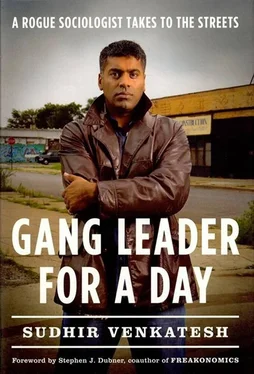“Well, do you mind if I just run up there and knock on the door?”
“Yeah, we do mind,” he said.
I tried again. “Maybe I’m in the wrong building. Is this 4040?”
He shook his head. “No one lives here. So you won’t be talking to anybody.”
I decided I’d better leave. I walked back through the lobby, bag and clipboard in hand. I crossed in front of the building, over an expansive patch of dead grass littered with soda cans and broken glass. I turned around and looked back at the building. A great many of the windows were lit. I wondered why my new friend had insisted that the building was uninhabited. Only later did I learn that gang members routinely rebuffed all sorts of visitors with this line: “No one by that name lives here.” They would try to prevent social workers,schoolteachers, and maintenance personnel from coming inside and interrupting their drug trade.
The young men from the building were still watching me, but they didn’t follow. As I came upon the next high-rise, I saw the faint markings on the pale yellow brick: Number 4040. At least now I was in the right place. The lobby here was empty, so I quickly skirted past another set of distressed mailboxes and passed through another dank lobby. The elevator was missing entirely-there was a big cavity where the door should have been-and the walls were thick with graffiti.
As I started to climb the stairs, the smell of urine was overpowering. On some floors the stairwells were dark; on others there was a muted glow. I walked up four flights, maybe five, trying to keep count, and then I came upon a landing where a group of young men, high-school age, were shooting dice for money.
“Nigger, what the fuck are you doing here?” one of them shouted. I tried to make out their faces, but in the fading light I could barely see a thing.
I tried to explain, again. “I’m a student at the university, doing a survey, and I’m looking for some families.”
The young men rushed up to me, within inches of my face. Again someone asked what I was doing there. I told them the numbers of the apartments I was looking for. They told me that no one lived in the building.
Suddenly some more people showed up, a few of them older than the teenagers. One of them, a man about my age with an oversize baseball cap, grabbed my clipboard and asked what I was doing. I tried to explain, but he didn’t seem interested. He kept adjusting his too-big hat as it fell over his face.
“Julio over here says he’s a student,” he told everyone. His tone indicated he didn’t believe me. Then he turned back to me. “Who do you represent?”
“Represent?” I asked.
“C’mon, nigger!” one of the younger men shouted. “We know you’re with somebody, just tell us who.”
Another one, laughing, pulled something out of his waistband. At first I couldn’t tell what it was, but then it caught a glint of light and I could see that it was a gun. He moved it around, pointing it at my head once in a while, and muttered something over and over- “I’ll take him,” he seemed to be saying.
Then he smiled. “You do not want to be fucking with the Kings,” he said. “I’d just tell us what you know.”
“Hold on, nigger,” another one said. He was holding a knife with a six-inch blade. He began twirling it around in his fingers, the handle spinning in his palm, and the strangest thought came over me: That’s the exact same knife my friend Brian used to dig a hole for our tent in the Sierra Nevadas. “Let’s have some fun with this boy,” he said. “C’mon, Julio, where you live? On the East Side, right? You don’t look like the West Side Mexicans. You flip right or left? Five or six? You run with the Kings, right? You know we’re going to find out, so you might as well tell us.”
Kings or Sharks, flip right or left, five or six. It appeared that I was Julio, the Mexican gang member from the East Side. It wasn’t clear yet if this was a good or a bad thing.
Two of the other young men started to search my bag. They pulled out the questionnaire sheets, pen and paper, a few sociology books, my keys. Someone else patted me down. The guy with the too-big hat who had taken my clipboard looked over the papers and then handed everything back to me. He told me to go ahead and ask a question.
By now I was sweating despite the cold. I leaned backward to try to get some light to fall on the questionnaire. The first question was one I had adapted from several other similar surveys; it was one of a set of questions that targeted young people’s self-perceptions.
“How does it feel to be black and poor?”I read. Then I gave the multiple-choice answers: “Very bad, somewhat bad, neither bad nor good, somewhat good, very good.”
The guy with the too-big hat began to laugh, which prompted the others to start giggling.
“Fuck you!” he told me. “You got to be fucking kidding me.”
He turned away and muttered something that made everyone laugh uncontrollably. They went back to quarreling about who I was. They talked so fast that I couldn’t easily follow. It seemed they were as confused as I was. I wasn’t armed, I didn’t have tattoos, I wasn’t wearing anything that showed allegiance to another gang-I didn’t wear a hat turned toward the left or right, for instance, I wasn’t wearing blue or red, I didn’t have a star insignia anywhere, either the five- or six-point variety.
Two of them started to debate my fate. “If he’s here and he don’t get back,” said one, “you know they’re going to come looking for him.”
“Yeah, and I’m getting the first shot,” said the other. “Last time I had to watch the crib. Fuck that. This time I’m getting in the car. I’m shooting some niggers.”
“These Mexicans ain’t afraid of shit. They kill each other in prison, over nothing. You better let me handle it, boy. You don’t even speak Mexican.”
“Man, I met a whole bunch of them in jail. I killed three just the other day.”
As their claims escalated, so did their insults.
“Yeah, but your mama spoke Mexican when I was with her.”
“Nigger, your daddy was a Mexican.”
I sat down on a cold concrete step. I struggled to follow what they were talking about. A few of them seemed to think that I was an advance scout from a Mexican gang, conducting reconnaissance for a drive-by attack. From what I could glean, it seemed as if some black gangs were aligned with certain Mexican gangs but in other cases the black gangs and Mexican gangs were rivals.
They stopped talking when a small entourage entered the stairwell. At the front was a large man, powerfully built but with a boyish face. He also looked to be about my age, maybe a few years older, and he radiated calm. He had a toothpick or maybe a lollipop in his mouth, and it was obvious from his carriage that he was the boss. He checked out everyone who was on the scene, as if making a mental list of what each person was doing. His name was J.T., and while I couldn’t have known it at this moment, he was about to become the most formidable person in my life, for a long time to come.
J.T. asked the crowd what was happening, but no one could give him a straight answer. Then he turned to me. “What are you doing here?”
He had a few glittery gold teeth, a sizable diamond earring, and deep, hollow eyes that fixed on mine without giving away anything. Once again, I started to go through my spiel: I was a student at the university, et cetera, et cetera.
“You speak Spanish?” he asked.
“No!” someone shouted out. “But he probably speaks Mexican!”
“Nigger, just shut the fuck up,” J.T. said. Then someone mentioned my questionnaire, which seemed to catch his interest. He asked me to tell him about it.
I explained the project as best as I could. It was being overseen by a national poverty expert, I said, with the goal of understanding the lives of young black men in order to design better public policy.
Читать дальше












